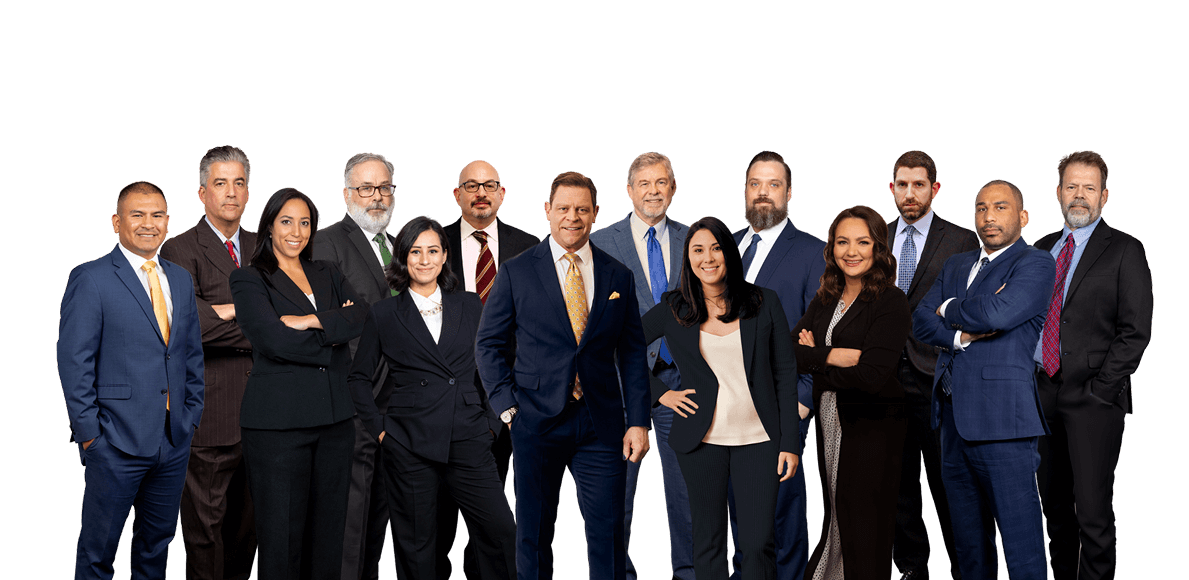The Fourth of July is a time to celebrate freedom and enjoy quality moments with family and friends. Celebrating Independence Day can bring excitement with fireworks, barbecues, and festivities, but it is also one of the most dangerous holidays on Texas roads and in residential neighborhoods.
Whether you’re behind the wheel or handling fireworks, safety should always come first. Celebrating responsibly means taking precautions to avoid serious accidents and protect those around you. Below is what you need to know to stay safe, understand your legal rights, and take action if something goes wrong this holiday weekend.
Key Takeaways:
- Fireworks injuries are common and can lead to burns, cuts, and eye damage. Even sparklers cause hundreds of injuries each year, especially among children.
- Several parties may be legally responsible for a firework injury, including individuals, parents, event organizers, manufacturers, or property owners.
- Many Central Texas cities ban fireworks within city limits. Legal use is generally limited to private property in unincorporated areas with specific restrictions.
- Fireworks should only be used in open areas, away from flammable materials. Always supervise children, wear eye protection, and avoid relighting fireworks that fail.
- If you’re injured, get medical help, take photos, keep any evidence, and talk to a lawyer before dealing with insurance companies.
- You may be eligible for compensation if the injury was caused by negligence or a defective product. In most cases, you have two years from the date of the incident to file a claim.
Most Common Firework Injuries During July 4th Celebrations
While fireworks are often seen as harmless bursts of bright colors and loud booms, they are a serious risk. Each year, especially around 4th of July, thousands of Americans end up in the emergency room because of firework-related injuries.
According to the U.S. Consumer Product Safety Commission, an estimated 14,700 people were harmed by fireworks last year. The most common type of firework injury is burns, which make up 37% of all firework-related emergency room visits.
Hands and fingers are the most frequently injured body parts, involved in 36% of reported cases. These injuries can include minor burns, serious lacerations, and in severe cases, even amputations. Injuries to the head, face, and ears account for 22% of incidents, ranging from burns and eye trauma to hearing loss.
Even sparklers, often considered the safest option, are a serious hazard. In 2024 alone, sparklers caused approximately 1,700 ER visits. Despite their small size, sparklers burn at temperatures of about 2,000°F. This makes them especially dangerous for young children, who are often the ones handed sparklers during celebrations.
Who Can Be Sued for a Firework Injury in 2025?
After being injured in a firework accident, it’s important to understand who may be held legally responsible. Liability often depends on the specific circumstances of the incident, but several parties could be at fault depending on how the injury occurred. These are the type of parties that may be responsible:
- Individuals who use fireworks recklessly, failing to maintain a safe distance, or using them while under the influence, can be held personally liable.
- Manufacturers or sellers of defective fireworks may be liable if a firework malfunctions due to a design flaw, production defect, or lack of proper warning labels.
- Event organizers are expected to follow strict safety protocols. If they fail to ensure public safety, manage crowds, secure the launch area, or have emergency response plans in plans, they may be held responsible.
- Adults who allow children to use fireworks unsupervised can be considered negligent if the child or someone else is injured as a result.
- Property owners who permit unsafe firework use on their premises, like a dry brush or combustible materials, or fail to intervene when illegal or hazardous fireworks are being used on their land.
Ultimately, to pursue a successful claim, the injured party must demonstrate that the responsible person or entity owed a duty of care, failed to meet that duty, and caused harm as a result.
What to Do Immediately After a Firework Accident
- Seek medical attention immediately- Call 911 for serious burns or injuries. Even minor wounds should be examined promptly, as fireworks injuries can worsen over time.
- Cool the burn- Run the affected area under cold water for at least 20 minutes. If water isn’t available, use any cold liquid to reduce pain and swelling.
- Protect the area – After cooling, cover the burn with cling film or a clean plastic bag to help prevent infection.
- Document everything- Take clear photos of your injuries, the accident scene, and any firework debris. This can be vital for both medical and legal follow-up.
- Gather witness info- Collect names and contact details from anyone who saw what happened, as their statements may support your claim.
- Preserve evidence- Save any firework remnants or packaging, which may be needed to identify defects or determine fault.
- Report the incident- Notify local authorities or the property owner to ensure there’s an official record of the event.
- Speak to a lawyer first- Before talking to insurance companies, consult a personal injury attorney to protect your rights and avoid jeopardizing your claim.
Where Can You Legally & Safely Light Fireworks in Central Texas?
Before using fireworks this Fourth of July, make sure you know where they’re allowed. Many Central Texas cities ban fireworks within city limits, while some areas permit them on private property in unincorporated zones with specific restrictions. It’s also important to be mindful of where you light fireworks, as improper use near dry grass or brush can quickly lead to dangerous fires. The table below outlines what’s legal and what’s not in each location.
| City | Personal Fireworks Legal? | Illegal Use | Legal Use |
|---|---|---|---|
| Austin/South Austin | No | Prohibited within city limits year-round; includes possession and sale. Fines enforced. | Allowed only outside city limits in unincorporated Travis County, away from public roads, parks, and restricted zones |
| Cedar Park | No | Banned within city limits and a 5,000-foot buffer zone. Only licensed displays allowed. | Permitted on private property beyond the buffer zone, following county rules. |
| San Marcos | No | Prohibited within city limits and 5,000 feet beyond. Includes all neighborhoods and public areas. | Allowed in unincorporated Hays County, on private property, and outside parks and roads. |
| San Antonio | No (city); Yes (some county safe zones) | Strictly prohibited within city limits. Possession or use may lead to fines. | Legal in designated “safe zones” in unincorporated Bexar County during holidays. |
| College Station | No | Not allowed within city limits. Only professional shows permitted. | Legal in unincorporated Brazos County, on private land, following county guidelines. |
| Georgetown | No | Banned within city limits and 5,000-foot buffer. | Allowed outside the buffer zone, on private property, away from restricted areas. |
| Killeen | No | Not permitted within city limits, including sale and use. | Legal in unincorporated Bell County, on private property under county rules. |
| New Braunfels | No | Illegal within city limits. Only city-sponsored displays allowed. | Legal in unincorporated Comal County on private land, away from parks and public facilities. |
| Round Rock | No | Banned within city limits and 5,000-foot buffer zone. | Permitted outside the buffer zone, on private property, away from restricted zones. |
| Temple | No | Not allowed within city limits. | Legal in unincorporated Bell County, on private property, in compliance with burn bans. |
Firework Prohibited Areas in Central Texas
City Limits (Fireworks Illegal)
5,000 ft Buffer Zone (Also Illegal)
Top Firework Safety Tips to Prevent July 4th Injuries
While knowing where you can legally light fireworks is important, it’s equally critical to follow basic safety practices to prevent serious injuries or property damage. Whether you’re setting off fireworks at home or attending a community show, keep these tips in mind to celebrate safely:
- Only light fireworks in open, outdoor areas that are free of dry grass and flammable materials
- Never allow children to handle fireworks or glow sticks without close adult supervision
- Avoid using fireworks near trees, homes, or structures that could catch fire
- Don’t point fireworks at people, vehicles, or buildings, always aim away
- Keep water nearby, such as a garden hose or a full bucket, for emergencies
- Do not try to relight fireworks that fail to ignite the first time
- Wear eye protection and move away promptly after igniting fireworks
- Be sure to read and follow all safety instructions printed on the firework packaging, and ensure each firework is handled properly
- Use glow sticks or confetti poppers as safer alternatives for children
Even with legal fireworks, improper use can result in burns, eye injuries, or worse. Taking a few extra seconds to follow safety precautions can make the difference between a fun celebration and a painful ER visit.
When Should You Call a Firework Injury Lawyer?
You should consult a personal injury attorney if your injury was caused by someone else’s careless use of fireworks. This includes situations where a person acted recklessly or failed to follow safety guidelines.
Legal advice is also important if you believe a defective firework contributed to the accident. Product defects, such as unexpected explosions or poor labeling, may make the manufacturer or seller liable.
If the injury happened at a public or organized event, an attorney can help determine whether the event organizers failed to meet safety obligations.
You should also reach out to a lawyer if your injuries required medical treatment, led to hospitalization, or caused lasting effects. A legal consultation can help you understand your rights, especially if you’re unsure whether you have a case.
In Texas, you generally have two years from the date of the incident to file a personal injury claim. Waiting too long may affect your ability to recover compensation.
Involved In A Firework Accident?
If you or a loved one has been injured by fireworks, our legal team is here to help. We offer a free case review and will fight to recover compensation for medical bills, lost income, pain and suffering, and lasting injuries. You can reach us anytime at (512) 900-4872. We’ll listen, answer your questions, and help you understand your next steps with clarity and care.
Firework Injury Lawsuit FAQs
Can I sue for a firework injury in 2025?
Yes, you can sue for a firework injury in 2025 if it was caused by negligence or a defective product. This includes reckless use, lack of supervision, or fireworks that malfunction due to design or manufacturing flaws. A personal injury claim can help you recover compensation for medical bills, lost income, and other damages.
How long do I have to file a fireworks injury lawsuit?
In Texas, you have two years from the date of the incident to file a personal injury claim. Missing this deadline may prevent you from recovering compensation. It’s important to act quickly so your attorney has time to build a strong case and preserve critical evidence.
What if I was injured at a public fireworks show?
Yes, you may be able to recover damages if you were injured at a public fireworks display. If event organizers failed to provide a safe environment, did not enforce safety barriers, or allowed unsafe conditions, they could be held liable.
Are parents liable for injuries caused by children with fireworks?
Yes, parents can be held responsible if their child causes a fireworks injury. If the injury resulted from poor supervision, negligence, or the use of illegal fireworks, the parent or guardian may be liable for the damages caused.
What compensation can I recover in a firework injury lawsuit?
You may be entitled to compensation for medical expenses, lost wages, and emotional distress resulting from the injury. In cases involving gross negligence or reckless behavior, you could also pursue punitive damages meant to hold the responsible party further accountable.



